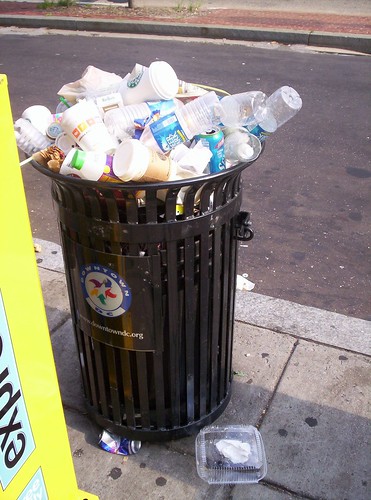Spoken like a true businessman: litter as a distinctive element of the experience of visiting India
I pick up litter in my neighborhood, and bottles and cans for recycling here and there as I walk or cycle (I am especially keen on removing glass bottles from the gutter pan in areas where I cycle). Compared to many cities across the country, I am always amazed at how trashy DC's commercial and residential streets can be. ("Bad" neighborhoods in other cities like Louisville are often less litter filled than better DC neighborhoods.)
See:
-- "Every Litter Bit Hurts," 2005
-- "The 'soft side' of commercial district revitalization," 2006
-- Keep Australia Beautiful National Litter Index 2011/2012 (their great survey form starts on page 163, it's much better than equivalent survey instruments normally used in the US)
Until the city's financial exigency in the early 1990s, the DC Department of Public Works had people assigned to maintain commercial district streets like H Street NE.
 Since then, many commercial districts have created business improvement districts, which have taken up this function, among others. The annual reports from the various BIDs always include statistics on the amount of trash they collected (most of this is from waste cans that people throw trash in, some is picked up from the streets and sidewalks).
Since then, many commercial districts have created business improvement districts, which have taken up this function, among others. The annual reports from the various BIDs always include statistics on the amount of trash they collected (most of this is from waste cans that people throw trash in, some is picked up from the streets and sidewalks). Most BIDs also have installed blue cans for recyclables, although many people fail to distinguish between the two types of cans.
A number of the BIDs have removed the large waste cans in favor of smaller ones. I don't think that makes sense. Weekend services typically can be improved also. (The image above is from a Saturday or Sunday.)
For awhile, I have argued that BIDs that abut neighborhoods should extend their services one block in either direction on the intersecting neighborhood streets, since most of the litter on those streets is generated by the commercial district.
India and litter as an element of place-based authenticity
Today's Post has an article, "Activists tell Indians to clean up their cities," about a movement in India to reduce litter, which is a problem of astronomical proportions there.
Rather than deal with the problem, some people want to celebrate it. From the article:
Some in the tourism industry say that the garbage problem is overstated — and that it actually might be part of the adventure of traveling in India.
“Our lack of cleanliness is a problem, but that will not scare foreign tourists away,” said Subhash Goyal, president of the Indian Association of Tour Operators. “If tourists want to see everything clean and sanitized, they would go to Singapore.”
I guess I need to write a book on Trash Tourism. (And a blog entry on the rise of spitting in public places.)
Obviously, that is an excuse. But people probably leave India with negative impressions about the people, because of the trash, regardless of the beauty of the places they have seen.
"Rural" mores and the city
Similarly, in The Future Once Happened Here, author Fred Siegel describes the reaction against what we might call the "socialization function of government institutions."
People who had been out of power saw training in civility as a tool of oppression, and rural mores with regard to litter, public urination, and spitting came to the city as a result of the migration to the cities, especially Washington, because a significant proportion of its population hails from the South.
Similarly, throwing something in a street gutter (or I have seen people deliberately dispose of bottles in street sewer entrypoints) is not properly disposing it.
I don't consider maintaining those behaviors in the city an element of the city's authenticity.
Labels: litter, public health, urban design/placemaking



1 Comments:
Great information. This works great for me. Thanks for sharing this :)
Post a Comment
<< Home